 Well, to begin with, it appears we should be calling them “elders”.
Well, to begin with, it appears we should be calling them “elders”.
One gentleman in the 3pm GMT video conference between India, the UAE and Mexico was quick to point this out. “Call us elders. I’m 72 but I don’t feel old. I feel like I’m an elder, I have something to give, but I don’t feel old.”
We agreed. Elders it was. It is…
While we at the Tony Blair Faith Foundation, in collaboration with HelpAge International, felt that we must do something to celebrate the UN International Day for Older Persons on 1 October, at the same time we wanted to explore with our students the issues affecting the world’s elders, how and why people of faith should be concerned about these issues and think about ways they could help.
Elders need to be treasured
We held three multipoint video conferences with some very special guest speakers. We were delighted to have Sawang Kaewkantha from HelpAge in Chang Mai join us in one video conference. Mr Shedaha, a poet and playwright and Osama Abu Nada from HelpAge, Palestine, join us from the Gaza Strip in another. And Walter Woods, from AARP in Washington DC share his expertise in the later slot. Joining these special guests we had over 200 students (and their grandparents) from The Philippines, India, Pakistan, UAE, Palestine and Mexico.
It’s not easy to surmise the content and outcomes of these five hour discussions, but I guess the overriding themes were that elders need to be treasured, that old age can be the most fulfilling part of your life, that the relationship between grandparent and grandchild is not only very special, but significant in the child’s development and that isolation of older people is a very real concern the world over which requires an intergenerational approach to its solution.
How can we help?
Our Palestinian poet explained it was the small things that matter: “Go and read to them, tell them stories and listen to their stories”. It was suggested faith communities could help by arranging these visits and giving packages of food to older people along with ensuring that older people can take part in all of the community’s activities, including pilgrimages.
Amongst all the dialogue on the issues there were some lovely moments, mostly in the forms of testimonies by some of the older people on the video chat or from the students. One Indian girl explained one of her inspirations is Guru Amar Das, who led the faithful from the age of 72.
Another told the story of Shravan Kumar as an example of how we should treat our elders. A Mexican student told us that if her grandmother had not raised her in the Catholic faith and explained the stories in the Bible to her she would not have her depth of faith now. She said: “It is the most important thing in my life, my faith, and my grandmother gave that to me”.
A grandmother in the UAE explained that giving her children and grandchildren a moral direction in life was her “work”. She gave us an arresting image with her words: “I am the trunk of a tree, and all those gone before me are the roots, my children are the branches and my grandchildren are the foliage and fruits”.
Read more about HelpAge’s activities around 1 October and our Age Demands Action campaign.
